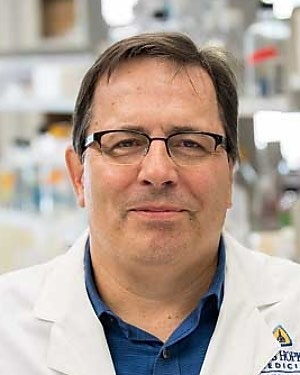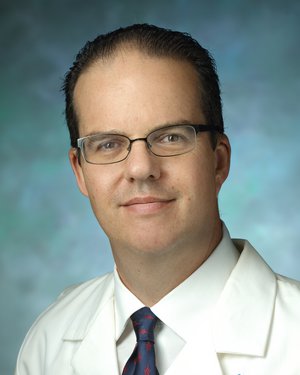Research Lab Results
-
Brent Petty Lab
Dr. Petty's laboratory interests focuses on antimicrobial chemotherapy, hospital-based medical practices, and internal medicine collaboration with ophthalmologic clinical trials.
-
Eberhart, Rodriguez and Raabe Lab
Utilizing a combination of tissue-based, cell-based, and molecular approaches, our research goals focus on abnormal telomere biology as it relates to cancer initiation and tumor progression, with a particular interest in the Alternative Lengthening of Telomeres (ALT) phenotype. In addition, our laboratories focus on cancer biomarker discovery and validation with the ultimate aim to utilize these novel tissue-based biomarkers to improve individualized prevention, detection, and treatment strategies. -
Srinivasan Yegnasubramanian Lab
Dr. Yegnasubramanian directs a Laboratory of Cancer Molecular Genetics and Epigenetics at the Sidney Kimmel Comprehensive Cancer Center (SKCCC), and is also the Director of the SKCCC Next Generation Sequencing Center. Our lab research is focused on understanding the complex interplay between genetic and epigenetic alterations in carcinogenesis and disease progression, and to exploit this understanding in developing novel biomarkers for diagnosis and risk stratification as well as in identifying targets for therapeutic intervention.
-
Samuel R. Denmeade Laboratory
The main research goals of my laboratory are: (1) to identify and study the biology of novel cancer selective targets whose enzymatic function can be exploited for therapeutic and diagnostic purposes; (2) to develop methods to target novel agents for activiation by these cancer selective targets while avoiding or minimizing systemic toxicity; (3) to develop novel agents for imaging cancer sites at earliest stages. To accomplish these objectives the lab has originally focused on the development of prodrugs or protoxins that are inactive when given systemically via the blood and only become activated by tumor or tissue specific proteases present within sites of tumor. Using this approach, we are developing therapies targeted for activation by the serine proteases prostate-specific antigen (PSA), human glandular kallikrein 2 (hK2) and fibroblast activation protein (FAP) as well as the membrane carboxypeptidase prostate-specific membrane antigen (PSMA). One such approach developed in the lab consists of a potent bacterial protoxin that we have reengineered to be selectively activated by PSA within the Prostate. This PSA-activated toxin is currently being tested clinically as treatment for men with recurrent prostate cancer following radiation therapy. In a related approach, a novel peptide-cytotoxin prodrug candidate that is activated by PSMA has been identified and is this prodrug candidate is now entering early phase clinical development. In addition, we have also identified a series of potent inhibitors of PSA that are now under study as drug targeting and imaging agents to be used in the treatment and detection of prostate cancer.
-
Cynthia Sears Laboratory
Work in the Cynthia Sears Laboratory focuses on the bacterial contributions to the development of human colon cancer and the impact of the microbiome on other cancers and the therapy of cancer. The current work involves mouse and human studies to define how enterotoxigenic Bacteroides fragilis, pks+ Escherichia coli, Fusobacterium nucleatum, biofilms and the colonic microbiota induce chronic colonic inflammation and colon cancer. Prospective human studies of the microbiome and biofilms in screening colonoscopy are in progress as are studies to determine if and how the microbiome impacts the response of individuals with cancer to immunotherapy and other cancer therapies.
-
Lei Zheng Lab
Zheng’s research focuses on two R01-funded projects; first, the group has developed a pancreatic cancer immunotherapy research program on a neoadjuvant therapy platform as well as a number of preclinical models of pancreatic cancer for developing innovative immunotherapy strategies. The group has applied the knowledge gained from pancreatic cancer immune-based therapies to the development of a colorectal cancer GVAX vaccine. Second, the group is aimed at understanding the mechanistic roles of the tumor microenvironment in cancer development and metastasis and identifying new targets for pancreatic cancer therapies by dissecting the tumor microenvironment of pancreatic cancer. -
Kathleen Gabrielson Laboratory
Research in the Kathleen Gabrielson Laboratory focuses on the signal transduction of cardiovascular toxicities in vitro, in cardiomyocyte culture and in vivo using rodent models. Specifically, the research focuses on understanding the mechanisms of various cancer therapies that induce cardiac toxicities. Currently, we are testing prevention strategies for these toxicities by studying the cardiac effects of the anthracycline doxorubicin (adriamycin) and the immunotherapeutic agent, Herceptin, anti-erbB2. We are focusing on the signal transduction pathways in the heart that are modulated by anti-erbB2 treatment, which in turn, worsens doxorubicin toxicity. Thus, understanding the mechanisms behind the combined toxicity of doxorubicin and anti-erbB2 will pave the way for the design of strategies to reduce toxicity, identify patients at risk and potentially allow higher levels of this effective combination therapy to be used with an improved long-term survival in patients.


